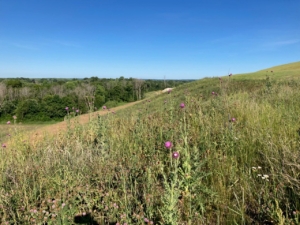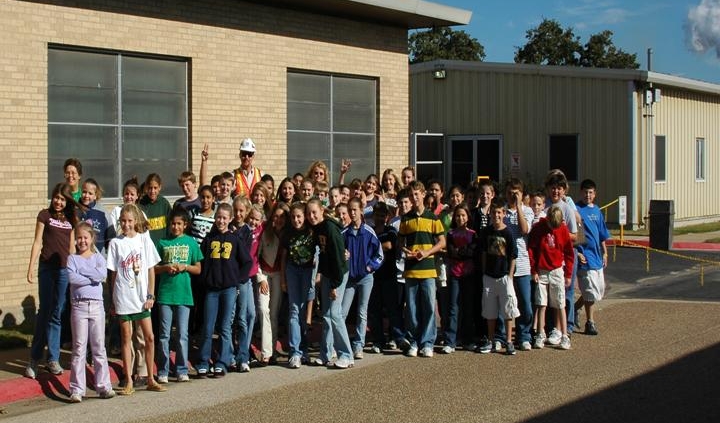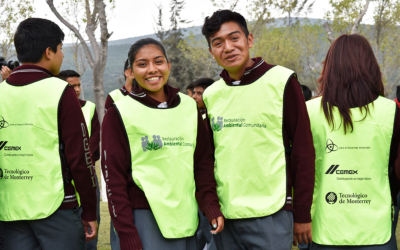Structured Lessons, Boundless Benefits – How Lannon Stone is using WHC Curricula to Create Memorable Field Trips
The Impact of Field Trips
Many of us can recall a pivotal field trip from our youth. Perhaps after observing tadpoles swimming in the creek, the lifecycle diagrams in your biology textbook suddenly made sense. Maybe a site tour given by an engineer or EHS professional even shaped your career path to this day.
Field trips offer proven benefits for children, inspiring life-long intellectual curiosity and contributing to higher scores on science exams, particularly among underserved students. Field trips that take place outdoors build confidence and independence while fostering positive attitudes toward the environment. Companies whose sites feature accessible outdoor areas have a unique opportunity to provide local children with immersive field trips that cover a wide range of environmental and STEM topics. Hosting field trips can, in turn, help companies meet employee engagement, employee wellness and community relations goals.
WHC and Lannon Stone: Developing Dynamic, Site-Specific Experiences
 During meetings with WHC member Lannon Stone (a quarry operation based in Wisconsin), WHC Consulting staff saw an opportunity to help Lannon Stone with their current field trip initiatives by providing the company with a curriculum for interactive, on-site activities aligned with Wisconsin learning standards.
During meetings with WHC member Lannon Stone (a quarry operation based in Wisconsin), WHC Consulting staff saw an opportunity to help Lannon Stone with their current field trip initiatives by providing the company with a curriculum for interactive, on-site activities aligned with Wisconsin learning standards.
Incorporating structured curricula into field trips benefits companies and schools in many ways:
- Clearly stated alignments between on-site activities and state learning standards
- A consistent, cohesive experience for school groups, who often return year-after-year
- Easy-to-follow instructions for chaperones and employee volunteers
- A smoother transition when employee project leaders, or school contacts, change
- Ease in evaluating the project’s success and publicizing positive outcomes
In producing curricula and other deliverables, WHC Consulting takes a personalized approach, tailoring its services to meet the needs of the company, facility and target audience. To create a curriculum that would best serve the company and local schools, WHC researched state learning standards and collaborated with Lannon Stone on the field trip format. WHC developed lesson plans with the following considerations in mind:
- Lannon Stone recently seeded an on-site berm with pollinator plants and wished to incorporate it into field trips.
- The company anticipated hosting up to 60 students at the site for 90 minutes at a time.
- One Lannon Stone employee would oversee field trip logistics, with individual activities led by employees or chaperones; it would not be possible to train activity leaders ahead of time.
- School groups would not have access to indoor spaces.
- The company wanted to keep the use of supplies, which can be difficult to use in inclement weather and result in additional inventory and maintenance work, to a minimum.
Under the resulting curriculum, students will be split into three groups. After a quick introduction to the company and quarry, and a review of safety guidelines, the groups will travel between three activity stations:
- Parts of a Plant: an observation activity that allows students to explore the roles of different plant parts
- Pollinator Tag: a freeze tag-style game in which students act out the pollination process
- Seed Dispersal: a classification activity in which students collect different types of seeds and think about the various ways that seeds are dispersed
After the final station, activity leaders will ask students open-ended questions about what they learned, and about the overall experience. This debriefing method will help students process the activities while helping Lannon Stone to evaluate the success of their field trips.
Moving forward, Lannon Stone will use this curriculum to market its educational offerings to local schools and will ultimately employ it during on-site field trips. The company has also enlisted WHC to create three more curricula, focusing on earth sciences lessons for all age groups.
Curricula and Beyond: WHC Consulting Services
With over three decades working at the intersection of business and biodiversity, WHC Consulting has helped companies in a variety of industries develop education projects, improve existing ones and evaluate their efforts in meaningful ways. In addition to creating curricula, WHC Consulting can assist with education and community engagement initiatives including Earth Day activities, Scouting projects and trainings that prepare employees for facilitating lessons. WHC ensures that companies’ education efforts are relevant and accessible for learners of all ages, and that they utilize hands-on, field-based experiences such as species identification, habitat monitoring and engaging demonstrations in lieu of textbook or lecture-style instruction.
To learn more about these services, contact whcconsulting@wildlifehc.org today.



